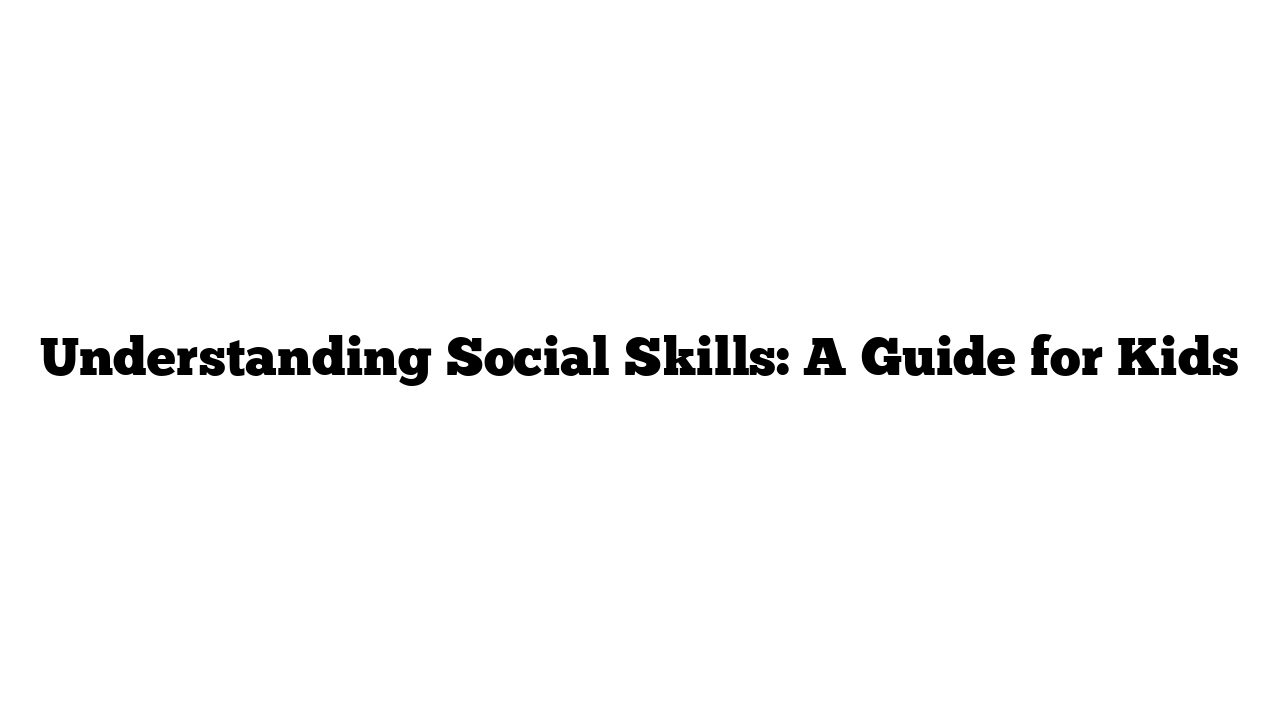Understanding Social Skills: A Kid-Friendly Guide
Social skills are an essential part of growing up. They’re what help you connect with others, understand emotions, and navigate the world with confidence. In this guide, we’ll explore what social skills are, the difference between good and poor social skills, and some easy-to-follow tips for improving them.
What Are Social Skills?
Social skills are the ways we interact, talk, and play with others. These skills help us communicate, understand other people’s feelings, and act appropriately in different situations. Good social skills are crucial because they make it easier to get along with friends, family, and teachers. Plus, as you grow up, these skills become even more valuable!
Good vs. Poor Social Skills
Learning what makes social skills “good” or “poor” can be really helpful. Let’s look at two examples: Ria and Ollie.
Great Social Skills: Meet Ria
Ria is a shining example of good social skills. Here’s what she does well:
- Starting Conversations: Ria knows how to begin and keep a conversation going. She listens carefully, nods, smiles, and asks questions, showing that she cares about what others are saying.
- Using Polite Words: Ria always remembers to say “please,” “thank you,” and “excuse me.”
- Reading Social Cues: Ria can sense how others are feeling by paying attention to their body language, facial expressions, and tone of voice. For example, if she notices someone is sad, she tries to find a way to help.
Poor Social Skills: Meet Ollie
Ollie, on the other hand, struggles with social skills. Here’s how:
- Interrupting Conversations: Ollie tends to interrupt others or walk away while they’re speaking, which can make others feel like he isn’t listening.
- Forgetting Manners: Ollie often skips saying “please” and “thank you” and needs reminders to use polite language.
- Misreading Social Cues: Ollie has a hard time recognizing when it’s an inappropriate time to talk, like when his mom is on the phone. He might also make jokes at the wrong time, like in class.
It can be hard for people to be around Ollie sometimes because he also gets upset easily and struggles to share his feelings.
Where Do You Fit In?
Are you more like Ria or Ollie, or maybe a little of both? If you find social skills challenging, you’re not alone! Many kids find it tough to understand others’ feelings or know exactly what to say. The good news is that anyone can improve their social skills with practice and a little patience.
Tips to Improve Your Social Skills
Here are some helpful strategies to become more like Ria, no matter where you’re starting from.
1. Think Before Acting
When you’re about to say or do something, ask yourself how it might make others feel. Thinking before you act helps you make better choices—like using polite words, speaking kindly, or joining in a friendly way.
2. Watch and Practice Conversations
If you find conversations tricky, try watching how others do it. Notice how they take turns talking, keep a conversation going, and show they’re listening. Practice these skills with family members or friends, and over time, it will start to feel easier and more natural.
3. Practice Using Empathy
Empathy means understanding how someone else is feeling. To practice empathy, pay attention to people’s faces and body language. If someone looks sad, think about what you might say or do to make them feel better. This will help you connect with others and show that you care.
4. Stay Positive
Sometimes, negative thoughts can make us feel shy or unsure around others. Try to replace those thoughts with positive ones, like “I’m a good friend” or “I can help others feel better.” Staying positive can boost your confidence and make it easier to connect with others.
A Quick Quiz: Where Do You Fit In?
Ask yourself these questions to see where you stand:
- Do I listen when others are talking?
- Do I use polite words like “please” and “thank you”?
- Can I tell when someone is feeling happy, sad, or upset?
If you answered “yes” to most of these, you’re likely on the right track! And if you answered “no” to a few, don’t worry—practice can make a big difference.
Final Thoughts
Improving your social skills can take time, but with regular practice, it gets easier. Remember, whether you feel more like Ria or Ollie, there’s always room to learn and grow. Social skills help us make friends, understand others, and build a happier life. Start practicing today, and see how these small changes can make a big difference!
For more resources on social skills and self-improvement, be sure to visit medicaltimes.io
